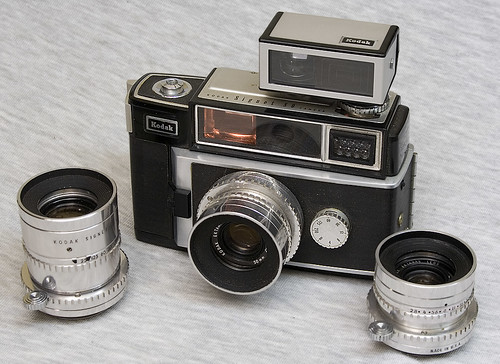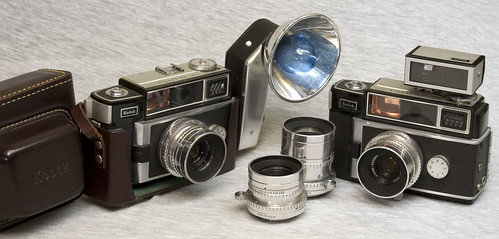Difference between revisions of "Kodak Signet 80"
m (ps to cw pool for both photos, updated img temp) |
(reorganizing sections and moving TOC up to top) |
||
| Line 2: | Line 2: | ||
||image_source= http://www.flickr.com/photos/26092923@N02/2585264056/in/pool-camerawiki/ | ||image_source= http://www.flickr.com/photos/26092923@N02/2585264056/in/pool-camerawiki/ | ||
|image= http://farm4.static.flickr.com/3142/2585264056_215774b7fe.jpg | |image= http://farm4.static.flickr.com/3142/2585264056_215774b7fe.jpg | ||
| + | |image_align=right | ||
|image_text= Kodak Signet 80 w/90mm, 50mm, and 35mm lenses (1958) | |image_text= Kodak Signet 80 w/90mm, 50mm, and 35mm lenses (1958) | ||
|image_by= Jack Hufnagel | |image_by= Jack Hufnagel | ||
|image_rights= with permission | |image_rights= with permission | ||
| − | }} | + | }} |
| + | |||
| + | |||
| + | The '''Kodak Signet 80''' was the last and most sophisticated camera in Kodak's Signet line. It is an interchangeable lens 35 mm [[rangefinder camera]] produced from 1958 to 1962 by [[Kodak]] in the USA. | ||
| + | |||
| + | __TOC__ | ||
| + | |||
| + | The body, constructed of die-cast metal and (mostly) [[Bakelite]], has a coincident [[coupled rangefinder]] combined with a very nice life-sized projected frame viewfinder. The camera has a synchronized behind-the-lens [[leaf shutter]] in a unique scissors lock lens mount. Two of the three Signet 80 lenses, the 50mm and 90mm, contain thorium oxide, and are somewhat [[radioactive]]. | ||
| + | |||
| + | This was Kodak's second attempt at an American-made camera system, the first being the [[Ektra]]. The Signet 80 was targeted at the photography enthusiast and is capable of taking high quality photographs. It originally sold for $130 USD<ref>History of Kodak Cameras at www.kodak.com</ref> , about $950 USD in 2007. For reference, this was about 75% of the cost of a [[Kodak Retina IIIc|Retina IIIC]], the most comparable German Kodak camera of that era. Unfortunately, quality of the Signet's materials and construction are significantly lower than the Retinas and it has reliability issues. It was never a really successful product and production was terminated after just four years. | ||
| + | |||
{{Flickr_image | {{Flickr_image | ||
||image_source= http://www.flickr.com/photos/26092923@N02/2565435446/in/pool-camerawiki/ | ||image_source= http://www.flickr.com/photos/26092923@N02/2565435446/in/pool-camerawiki/ | ||
|image= http://farm4.static.flickr.com/3117/2565435446_675e7ae361.jpg | |image= http://farm4.static.flickr.com/3117/2565435446_675e7ae361.jpg | ||
| − | |image_align= | + | |image_align= left |
| − | |image_text= Kodak Signet 80 | + | |image_text= Kodak Signet 80's with case, flash & lenses |
|image_by= Jack Hufnagel | |image_by= Jack Hufnagel | ||
|image_rights= with permission | |image_rights= with permission | ||
}} | }} | ||
| + | {{brl}} | ||
| + | ==Specifications from manual== | ||
| − | |||
| − | |||
| − | |||
| − | |||
| − | |||
| − | |||
'''FILM''' | '''FILM''' | ||
*FILM LOAD-Kodak 135, 20 or 36-exposure magazines | *FILM LOAD-Kodak 135, 20 or 36-exposure magazines | ||
| Line 52: | Line 59: | ||
*Various Kodak Kodalite flash holders{{br}}{{br}} | *Various Kodak Kodalite flash holders{{br}}{{br}} | ||
| − | + | == References == | |
<references /> | <references /> | ||
| − | + | ||
| + | == Links == | ||
* [http://www.butkus.org/chinon/kodak/kodak_signet_80/kodak_signet_80.htm Signet 80 Manual] on [http://www.butkus.org/chinon/ Mike Butkus' site] | * [http://www.butkus.org/chinon/kodak/kodak_signet_80/kodak_signet_80.htm Signet 80 Manual] on [http://www.butkus.org/chinon/ Mike Butkus' site] | ||
* [http://www.kodak.com/global/en/consumer/products/techInfo/aa13/aa13.pdf History of Kodak Cameras at Kodak's website] | * [http://www.kodak.com/global/en/consumer/products/techInfo/aa13/aa13.pdf History of Kodak Cameras at Kodak's website] | ||
| + | |||
== Bibliography == | == Bibliography == | ||
| − | |||
* Brian Coe, ''Kodak Cameras - The First Hundred Years'', Hove Foto Books, 1988 | * Brian Coe, ''Kodak Cameras - The First Hundred Years'', Hove Foto Books, 1988 | ||
* Original Kodak user manual for the Signet 80 | * Original Kodak user manual for the Signet 80 | ||
Revision as of 18:36, 15 August 2011

|
| Kodak Signet 80 w/90mm, 50mm, and 35mm lenses (1958) image by Jack Hufnagel (Image rights) |
The Kodak Signet 80 was the last and most sophisticated camera in Kodak's Signet line. It is an interchangeable lens 35 mm rangefinder camera produced from 1958 to 1962 by Kodak in the USA.
The body, constructed of die-cast metal and (mostly) Bakelite, has a coincident coupled rangefinder combined with a very nice life-sized projected frame viewfinder. The camera has a synchronized behind-the-lens leaf shutter in a unique scissors lock lens mount. Two of the three Signet 80 lenses, the 50mm and 90mm, contain thorium oxide, and are somewhat radioactive.
This was Kodak's second attempt at an American-made camera system, the first being the Ektra. The Signet 80 was targeted at the photography enthusiast and is capable of taking high quality photographs. It originally sold for $130 USD[1] , about $950 USD in 2007. For reference, this was about 75% of the cost of a Retina IIIC, the most comparable German Kodak camera of that era. Unfortunately, quality of the Signet's materials and construction are significantly lower than the Retinas and it has reliability issues. It was never a really successful product and production was terminated after just four years.

|
| Kodak Signet 80's with case, flash & lenses image by Jack Hufnagel (Image rights) |
Specifications from manual
FILM
- FILM LOAD-Kodak 135, 20 or 36-exposure magazines
- NEGATIVE SIZE-24mm x 36mm
LENSES are removable as a complete unit to substitute wide-angle or telephoto lens.
- 50mm, f/2.8 Kodak Ektanar, Lumenized. Standard Lens. LENS OPENINGS-Marked in EVS - 5 to 17, as well as f/numbers - 2.8 to 22. Uses Series 5 filters.
- 35mm, f/2.8 Kodak Ektanar, Lumenized. Wide Angle Lens LENS OPENINGS-Marked in EVS - 5 to 17, as well as f/numbers - 2.8 to 22. Uses Series 5 filters.
- 90mm, f/4.0 Kodak Ektanar, Lumenized. Telephoto Lens LENS OPENINGS-Marked in EVS - 6 to 17, as well as f/numbers - 4.0 to 22. Uses Series 5 filters.
SHUTTER
- SPECIAL SHUTTER-set as film is advanced
- SPEEDS - 1/4, 1/8, 1/15, 1/30, 1/60, 1/125, 1/250 and "B"
- RELEASE - Plunger-type-with cable release socket located on right top of camera.
- FLASH - Built-in synchronization for class F, M, and electronic flash. Flash receptacles on camera body accept Kodalite Super-M 40 Flasholder, Kodak Rotary Flasholder, Type 1, and Kodak Generator Flasholder, Type 1. Accessory shoe and PC socket for electronic and other flashes.
EXPOSURE METER
- Uncoupled Selenium Cell, built-in. Reads reflected and incident light in EV numbers. Film speeds from 10 to 1600 ASA.
VIEWING AND FOCUSING
- VIEWFINDER - Optical, projected viewframe-type, unit-power
- COUPLED RANGEFINDER - Superimposed image type, couples with all lenses- combined with viewfinder }
- FOCUSING RANGE - infinity to 2 1/2 feet
FILM OPERATION
- Unique "injection" film-loading-with leader windoff. Rapid 2-stroke film advance right side of camera. Rewind crank on right bottom of camera.
CONSTRUCTION
- BODY - Die-cast metal and tough molded material (Bakelite) with abrasion-resisting Kododur covering
- TRIPOD SOCKET - In base of camera
ACCESSORIES
- Kodak Signet Multi-Frame Finder
- Kodak Signet 80 Field Case
- Kodak Signet Microscope Adapter
- Various Kodak Kodalite flash holders
References
- ↑ History of Kodak Cameras at www.kodak.com
Links
Bibliography
- Brian Coe, Kodak Cameras - The First Hundred Years, Hove Foto Books, 1988
- Original Kodak user manual for the Signet 80